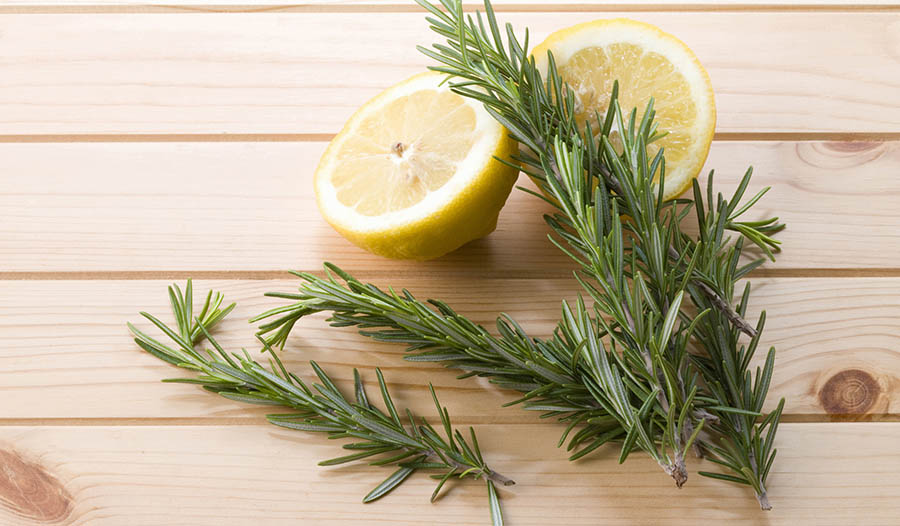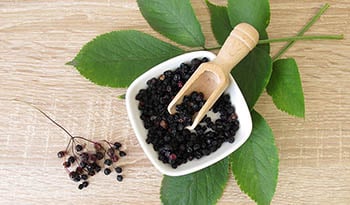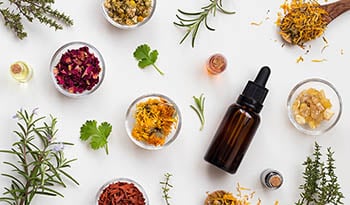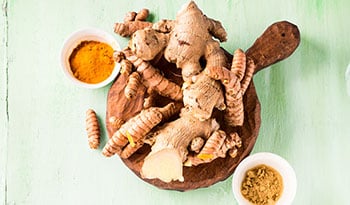The Health Benefits of Rosemary
DISCLAIMER:This blog does not intend to provide diagnosis...
- In this article:
- Cooking with Rosemary
- Hair Growth
- Help Improve Cognitive Function
- May Help with Alzheimer’s
- Liver Protection
- Skin Protection
- Upper Respiratory Infection
- Diabetes
- Heart Disease
- Anti-microbial Properties
- Other Benefits of Rosemary
- Side effects
- Uses of Rosemary

Rosemary is a perennial evergreen herb native to the Mediterranean region. With its fine, needle-like leaves and flowers, it resembles the lavender plant and is related to the mint family.
Rosemary has a distinctive smell and can be grown both outdoors and indoors, as long as adequate sunlight is present. The plant commonly grows along the coastal regions of the Mediterranean sea, simply from the moisture from the ocean. It’s quite a resilient herb and a potent antioxidant.
The ancient Greeks recognized rosemary’s benefits for memory. It has been connected with the Titaness Mnemosyne, the goddess of memory, and it has even been said that ancient scholars would wear wreaths of rosemary during exams to optimize recall.
In modern times, rosemary has been shown to have many health benefits and, according to an article in the New York Times, rosemary plays a big part in the diet of one of the world’s healthiest and oldest living populations—those who reside in Acciaroli, Italy
Cooking with Rosemary
If you have not cooked with rosemary, now is a good time to start. Rosemary has been used in culinary arts since at least 500 BC and is still used worldwide. It can add plenty of flavor to food — it is frequently added to vegetable soups, casseroles, stews, and salads. Use it in your poultry dishes. It also goes well with rice, mushrooms, and other grains.
Rosemary is rich in the following nutrients:
It is also a rich source of antioxidants, specifically rosamarinic acid and carnosic acid, which are believed to provide many of the herb’s health benefits. When consumed as a food, rosemary is a good source of dietary fiber, which aids in digestion and bowel regularity.
Hair Growth
Premature hair loss is a common concern for both men and women. While the cause may be genetic in some cases, stress and hormone imbalance can also contribute to loss of hair. No matter the cause, trying to slow down the loss or encourage new hair growth is a goal for many. Rosemary may be a natural approach one can take to assist with this goal. A 2015 study compared rosemary with the FDA approved drug minoxidil (Rogaine). Results were similar in that rosemary showed improved hair growth, just like the drug, when applied topically to the scalp. It took six months, however, for growth to be seen, so patience is required.
Help Improve Cognitive Function
Optimizing memory and brain health is crucial. Developing dementia is one of the biggest fears people have when it comes to aging. Finding novel approaches to maintain memory and sharpen brain speed is critical.
While the Greeks recognized rosemary’s memory benefits thousands of years ago, a 2012 study showed doses of 750 mg per day could be beneficial in cognition while doses up to 6,000 mg had the opposite effect. A 2015 study using rosemary extract (40% carnosic acid) showed a beneficial effect on memory, using an animal model.
A 2017 study concluded, “Inhalation of the rosemary essential oil increased the memorization of numbers” (inhalation can be done using an essential oil diffuser). A 2016 study using animals showed improved brain function in brain-injured subjects while a 2018 study, which added rosemary extract to pure water, noted test subjects had improved cognition when compared to the group who consumed plain mineral water.
May Help with Alzheimer’s
Alzheimer’s disease is the most common cause of dementia in the aged population. It is caused by the formation of beta-amyloid plaques in the brain. Preventing the formation of these plaques and assisting in their removal is key to minimizing memory loss.
In a prior article, Natural Approaches to Alzheimer’s. I explained how a comprehensive approach is fundamental to optimizing brain health and memory. Rosemary may play a role, according to scientific studies.
A 2009 study in Psychogeriatrics revealed that aromatherapy with rosemary could be beneficial in those with Alzheimer’s disease. A 2016 study in Neurochemical Research showed that carnosic acid, an active ingredient in rosemary, could help prevent the formation of beta-amyloid plaques from forming in the brain. This is central to the prevention of Alzheimer’s disease. More studies are forthcoming.
Liver Protection
The liver is responsible for filtering blood and helping to neutralize environmental toxins an individual may be exposed to. A 2014 study showed that rosemary could help protect the liver from chemical toxins. A 2016 study in Phytomedicine showed that rosemary could help liver cells regenerate after damage. In addition, a 2015 study using anemia models indicated that rosemary could help protect against the development of liver cirrhosis.
Skin Protection
The sun is vital for overall health and wellbeing. In addition to assisting in the production of vitamin D, the sun provides energy for every living object on earth. However, excessive exposure to the sun’s ultraviolet light can cause skin damage and accelerate the aging process. Finding natural ways to protect the skin is the goal of many as the overall benefit of sunscreen has been called into question over the last several years with some studies challenging its overall cancer-protecting benefits.
A 1994 study showed that rosemary could help prevent skin cancer in mice. A 2014 study showed that rosemary, when applied topically, could help protect the skin from ultraviolet light damage, a prerequisite for most skin cancers. Lastly, a 2014 study noted that more studies were needed before it can be concluded that rosemary has antiaging properties.
Upper Respiratory Infection
A chest or head cold, also known as an upper-respiratory infection, is the most common type of infection worldwide. There are more than 200 viruses that can cause infections of the respiratory tract. Treatment is primarily aimed at symptomatic care such as reducing congestion and assisting one to breathe as easily as possible. To date, there is no “cure” for the common cold.
Inhalation of an herbal mixture containing rosemary can minimize symptoms of upper respiratory infection, according to studies using essential oils. This essential oil can be aerosolized using a vaporizer.
Diabetes
Diabetes is becoming more common as the world population becomes more overweight. Diet and lifestyle choices play a big role in the development of diabetes. According to a 2017 study in Nutrients, rosemary has diabetic-fighting properties. Another 2017 study also showed the benefits of rosemary in the treatment of diabetes. For the many diabetics who develop nerve-related pain, topical rosemary may be helpful for pain management, according to a 2017 study.
Heart Disease
Heart disease is a leading cause of premature death worldwide. Those who survive a heart attack are commonly left with severe disability. A 2017 study using rats who had experienced a heart attack, rosemary was beneficial in their cardiac recovery. Human studies are still needed to see if the benefit carries over to people.
Anti-microbial Properties
Natural approaches to protect one against pathogens are being sought due to a concern of increasing antibiotic resistance. Rosemary is one such substance which has these properties. A 2007 study demonstrated rosemary’s anti-bacterial and anti-fungal properties. A 2017 study also showed rosemary’s antibacterial properties against staph infections, Pseudomonas, and Enterococcus strains of bacteria. Others studies have looked at adding rosemary to food in an attempt to prevent food-borne illnesses from pathogens.
Other Benefits of Rosemary
A 2018 study in Frontiers in Pharmacology showed that rosemary also had beneficial effects on depression and can help rebalance the gut microbiome.
Side effects
Overall rosemary is safe. However, when applied topically, it can sometimes cause skin irritation, a condition doctor’s call dermatitis. A 2014 study encouraged healthcare professionals to consider this in patients with skin issues. Taken in amounts larger than recommended on the label can cause seizures, pulmonary edema, nausea, and vomiting. If using as an essential oil, dilution is required. There are no known prescription drug interactions with rosemary.
Uses of Rosemary
- Herbal spice with food - Use to taste
- Supplements- As directed on the label
Essential Oil- Directions: Use with a diffuser. Place 2-3 drops in diffuser along with water. Inhale. A few drops can be added to a glass of water to consume orally. Rosemary blends well with lavender and peppermint oils. Learn more about other essential oils.
References:
- Pathophysiology. 2017 Sep 14. pii: S0928-4680(17)30005-6. doi: 10.1016/j.pathophys.2017.08.002.
- Accessed January 27, 2018 https://www.nytimes.com/2016/10/20/world/what-in-the-world/rosemary-and-time-does-this-italian-hamlet-have-a-recipe-for-long-life.html?_r=0
- Skinmed. 2015 Jan-Feb;13(1):15-21. Rosemary helps hair growth
- J Med Food. 2012 Jan;15(1):10-7. doi: 10.1089/jmf.2011.0005. Epub 2011 Aug 30.
- Med J Islam Repub Iran. 2015 Mar 9;29:187. eCollection 2015.
- O.V. Filiptsova, L.V. Gazzavi-Rogozina, I.A. Timoshyna, O.I. Naboka, Ye.V. Dyomina, A.V.
- Ochkur, The essential oil of rosemary and its effect on the human image and numerical short-term memory, In Egyptian Journal of Basic and Applied Sciences, Volume 4, Issue 2, 2017, Pages 107-111.
- Neuroscience Letter. 2016 May 27;622:95-101. doi: 10.1016/j.neulet.2016.04.048. Epub 2016 Apr 22.
- J Psychopharmacol. 2018 Dec;32(12):1319-1329. doi: 10.1177/0269881118798339. Epub 2018 Oct 15. (Rosemary water vs Mineral water effect on memory)
- Psychogeriatrics. 2009 Dec;9(4):173-9. doi: 10.1111/j.1479-8301.2009.00299.x.
- Neurochem Res. 2016 Sep;41(9):2311-23. doi: 10.1007/s11064-016-1945-6. Epub 2016 May 11.
- BMC Complement Altern Med. 2014 Jul 7;14:225. doi: 10.1186/1472-6882-14-225. (rosemary protects the liver from toxic chemicals)
- Phytomedicine. 2016 Dec 1;23(13):1574-1582. doi: 10.1016/j.phymed.2016.09.010. Epub 2016 Sep 30.
- Saudi J Biol Sci. 2015 Mar;22(2):157-63. doi: 10.1016/j.sjbs.2014.08.005. Epub 2014 Sep 17.
- Evid Based Complement Alternat Med. 2017;2017:7359806. doi: 10.1155/2017/7359806. Epub 2017 Feb 13.
- Nutrients. 2016 Nov 17;8(11). pii: E731. (Anti-cancer properties of Rosemary)
- Cancer Res. 1994 Feb 1;54(3):701-8.
- J Photochem Photobiol B. 2014 Jul 5;136:12-8. doi: 10.1016/j.jphotobiol.2014.04.007. Epub 2014 Apr 20.
- Inflamm Allergy Drug Targets. 2014;13(3):168-76.
- Nutrients. 2017 Sep 1;9(9). pii: E968. doi: 10.3390/nu9090968.
- Cardiovasc Hematol Disord Drug Targets. 2017 Jul 4;17(1):11-17.
- J Nurs Scholarsh. 2017 Jul;49(4):379-388. doi: 10.1111/jnu.12300. Epub 2017 Jun 12.
- PLoS One. 2017 May 11;12(5):e0177521. doi: 10.1371/journal.pone.0177521. eCollection 2017.
- J Agric Food Chem. 2007 Sep 19;55(19):7879-85. Epub 2007 Aug 21.
- Exp Biol Med (Maywood). 2017 Mar;242(6):625-634. doi: 10.1177/1535370216688571. Epub 2017 Jan 17.
- Recent Pat Food Nutr Agric. 2015;7(1):53-61.
- Front Pharmacol. 2018 Oct 2;9:1126. doi: 10.3389/fphar.2018.01126. eCollection 2018.

 By Dr. Eric Madrid, M.D.
By Dr. Eric Madrid, M.D.


